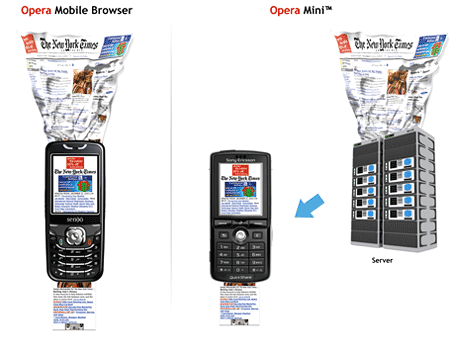Opera is a great browser that has its friends and supporters, and people who have no problems pointing out its strengths, even though they may use a different browser themselves. There are some, however, who seems unable to be happy on behalf of Opera or say anything about Opera unless it is to pull the browser down.
With the recent registration code giveaway to celebrate Opera’s 10 year birthday, complaints over the ads in Opera were almost gone – although I did see one who blamed Opera for the ads on the web pages, because Opera don’t feature a built in ad blocker… The usual claims of bloatednes prevailed though.
Now, as said in the Wikipedia, software bloat is two things: To use larger amount of system resources than before, or to implement extraneous functions. How does this relate to Opera?
Opera is a small download, smaller than its competition, even though it includes more features. Installed, it’s also less demanding on system resources, so obviously the bloat can’t refer to the coding. This is confirmed by those who claims Opera is bloated, in that they speak about the interface and features. So, let’s look a bit closer into that.
First a definition:
- Extraneous
- adj. Something that is extraneous happens or concerns things outside the situation or subject that you are talking about.
Extraneous functions in Opera should therefore be functions that is outside its intended “working area” – this is not just a browser, but the whole internet suite. However, let’s look at the browsing experience first.
Email, irc, newsreader, rss feed reader – these things are by default not enabled. Thus, if you just want a browser and nothing more, there are no extra features to clutter up the UI and confuse you. In practical terms it means they don’t exist. The sidebar also contains various options; some enabled by default, some not. Again – if you don’t want them, they don’t exist, for all practical purposes.
So those features that don’t show up in the user interface don’t contribute to the claimed bloat. That leaves only the browser features themselves. Are they really that bloated – that is, do they really include much that doesn’t have anything to do with browsing? At the first glimpse: No. The few buttons that are immediately available all have to do with the navigation of web pages. Clicking on the address bar reveals some more, but these functions are also directly linked to navigation of web pages. How is it, compared to other browsers? It’s different – but not really more than people expect to have these days.
So, no bloat in the browser, I’d say. All of the available functions have to do with browsing and navigating the web pages, the Opera way. True, you may prefer a different setup, different functions – but these are only a right click away, to customise everything to your liking.
With this in mind, what is it that makes these people claim that Opera is bloated, when looking at what the browser actually do goes against these claims? It’s just plain silly…

 I was buying some music the other day, as I had got a gift certificate for quite a bit to spend in the music store. I had heard the latest Coldplay album should be great, so I decided I should listen to it to see what it was. The headphones fit snugly around my ears as the sales woman put the CD in the player and gave me the cover.
I was buying some music the other day, as I had got a gift certificate for quite a bit to spend in the music store. I had heard the latest Coldplay album should be great, so I decided I should listen to it to see what it was. The headphones fit snugly around my ears as the sales woman put the CD in the player and gave me the cover.